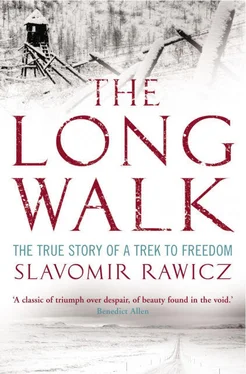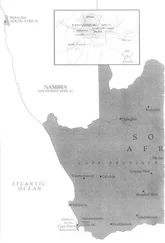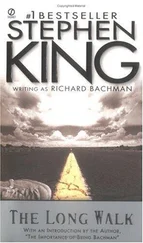The troops arrived about 11 a.m. after the morning issue of bread and coffee had been completed. They started work immediately re-checking the list of prisoners’ names. At times the checking became chaotic. Some names had to be shouted out several times before the men concerned recognized them in their mispronounced Russian form. As each batch of one hundred names were ticked off on the lists, the men were led away in a column towards the waiting lorries. Whether by design or not, the truck communities were split up. I found myself with an almost entirely different bunch of men as we moved away. We were led to the space between the sixth and seventh lorries and there we stood for some hours while the paper work and the marshalling went on throughout the afternoon in the field.
The light of a clear, cold, December day was fading as the preliminaries ended. The soldiers were detailed into sections of about twenty, each in charge of an N.C.O. or junior officer. Each section was disposed to guard one hundred prisoners, strung out two abreast behind each lorry. We watched the proceedings with interest, chilled and hoping there would soon be a move.
There had been a low buzz of talk all the way down the great line of men. Suddenly it was stilled, cut short in shock and appalled surprise, as from each lorry was uncoiled a length of heavy steel chain of about one inch diameter. A soldier in my detachment walked between the two men at the head of my column, forcing them apart, and then walked through the middle cleaving us into two single lines. Other soldiers followed him, running out the chain. On shouted instructions, we picked up the chain with the hand nearest to it. I was about halfway along with my left side to the chain. I remember thinking I was lucky not to have to use my right hand, which was still open, raw and painful. The chain was brand new, still coated with some dark, sticky, anti-rust compound, and its coldness struck the hand almost like a burn. Then, fifty men a side, we were handcuffed to the chain by one wrist. Three guards took station on each side, spaced along the line, the section commander climbed into the cab alongside the driver and the remaining troops piled quickly into the back of the lorry. We were ready to start. The prisoners remained very silent.
Like some great, slowly-walking reptile, the long procession began to move, the lorry at the head setting the pace, a fair walking speed of about four miles an hour. The forward end of the chain was secured to a strong spring-closed hook, a fixture normally used for towing jobs. As our lorry moved and the chain took up the strain, we strode out, automatically falling into step. There was just enough room between the man ahead and the man behind for me to to step out without hindrance. When the leading lorry struck a deeper drift of snow, the whole convoy piled forward and then stopped, vehicle by vehicle, prisoner group by prisoner group, until the full marching speed was resumed.
We trudged non-stop through that first dark night at the beginning of the third week in December for twelve hours or more. The leading lorry lighted the way with the beam of bright lamps. We struggled on in the blackness, obeying the insistent pull of the chain, still wondering where we were going, fearful of how long we should have to march on in this killing cold. The road was obviously well known and I had no doubt that this first long drag by night was intended to take us clear of any inhabited places near Irkutsk, unseen by the Russian civilian population. In the following days the programme was one of day marches and night halts, but the route was chosen still to avoid places where we might be seen. So vast and thinly-populated are these stupendous areas of Siberia, that I saw not a single native in the length of Irkutsk province.
A halt was called about half-an-hour after dawn in a wooded depression between two hills. We were all stiff, weighed down with heavy-limbed fatigue, cold and hungry. In my group were men of all ages, from lads of 17 to men of over 60, and from many different civilian backgrounds. Some of the older men were moaning already with misery. They were for the most part professional types, lawyers and architects and the like, who had reached that stage in life before the coming of the Russians when they drove in their cars from home to office and back again — men who had given up the physical caperings of youth and could look not too far ahead to a well-to-do, respected and comfortable retirement. They were skirmishing with death and they had such paltry weapons left for the fight. Then and later we younger men did what we could to help them along, but casualties among them were heavy indeed.
That first stop lasted only a couple of hours, long enough for the field kitchen which had accompanied us to brew up hot coffee and for the soldiers to distribute the bread ration. The heat of the coffee was like a breath of warm life, and we ate ravenously of our bread. We were not unshackled from the chain and in all too short a time we were on the move again, this time in daylight.
The six flanking guards were regularly changed every two hours. They jogged forward to the lorry, six reliefs jumped down, and a new turn of duty started without slowing the march of the winding, toiling column of prisoners. Over the exposed places on high ground the wind howled like a chorus of demons, our feet slipped in the churned up snow, tips of fingers, ears and noses felt the insidious attack of frostbite. And, even this early, the toll of death started. A shout, passed from a contingent well behind us, was relayed along by the walking sentries until it reached the transport commandant in the leading lorry. The leader stopped, the rest stopped. Some poor prisoner was unshackled, his body removed. The same method of disposal was followed as for the dead of the train. The clothes and boots were removed, the corpse was left behind under a mound of snow. This was the first of many. Taking my own section as typical, the death-rate was to reach between ten and fifteen per cent before the long trek was over.
It was difficult to appreciate that we were following any kind of regular road. Everything was blanketed with thick snow. But every hundred yards there would be a stout stake about eight feet tall topped by a well-lashed-on clump of dried hay or small twigs, like a succession of witches’ brooms. These, I guessed, were route markers. They were with us for miles, up steep hills, down into forested valleys, across the fording places of hard-frozen rivers. There were times when even the chain-bound lorry wheels began to slip and then the soldiers would jump down and put their shoulders into a helping heave and we prisoners, motivated only by a desire to get to our resting-place as soon as possible, would close up behind and add our considerable weight to the effort. It was hard going, and it got worse as we progressed.
Few of the marchers had any doubt of our direction. We were pushing north — almost due north — out towards the upper end of Irkutsk province towards the great sprawling area of Yakutsk. We were probably following a course roughly parallel with the western shore of Lake Baikal, that mighty, banana-shaped expanse of inland water stretching over four hundred miles north from its southern tip where the town of Irkutsk lies across the Trans-Siberian Railway. We were headed north from Latitude 50°N. to Latitude 60°N. and beyond, up towards the Arctic Circle, and the Siberian weather got worse as we went forward.
The march continued on the second day until late afternoon. It might, I feel, have ended earlier if we could have reached a sheltered position before this, but, as was to be the practice from then on, there appeared to be an order requiring the Commandant to find some unexposed place, usually in the lee of woods, for the night’s halt. The consideration was almost certainly one of expediency rather than a humanitarian one. Since so much time, effort and money was being spent in getting this considerable free labour force from one end of Russia to the other, there must have been some pressure on the Commandant to bring through as many men as possible still capable of work. Now, outside the settled area of urban Irkutsk, we were unshackled for the night and allowed to light fires. As in the potato field, we dug into the snow to get some warmth and clung close together, dozing in the light of fires for which, with cramped and frozen hands, we had eagerly foraged the wood from the trees about us. There we had our second mug of coffee of the day, and those who had been careful enough to save some bread from the morning issue ate as they drank.
Читать дальше






![Джеффри Арчер - The Short, the Long and the Tall [С иллюстрациями]](/books/388600/dzheffri-archer-the-short-the-long-and-the-tall-s-thumb.webp)





